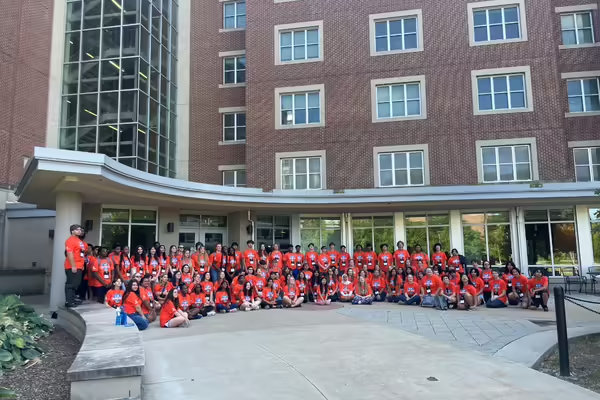
High school students are invited to dive into hands-on discovery and explore future careers during Illini Summer Academies, hosted by Illinois Extension 4-H on the University of Illinois Urbana-Champaign campus from June 22–26, 2025. This immersive, five-day experience offers a glimpse into college life and features interactive sessions led by Illinois faculty, including five sessions hosted by the College of Agricultural, Consumer and Environmental Sciences.
From buzzing with honeybees to decoding ag-tech and tackling global food issues, ACES-hosted academies connect teens with today’s most pressing challenges — and the tools to solve them:
- Growing with Tech: Intro to Digital Ag
- Economics of Food Insecurity
- Explore Sustainability
- Harness the Power: Ag Tech Innovations
- Honeybee Biology and Beekeeping (ACES and College of Liberal Arts & Sciences)
- Veterinary Medicine and Animal Sciences Academy (ACES and College of Veterinary Medicine)
More exciting academies hosted from units across the U. of I. campus include:
- AI & Machine Learning (School of Information Sciences Informatics)
- Applied Health Sciences in Action (College of Applied Health Sciences)
- Exploring Business (Gies College of Business)
- Exploring Your Options in Engineering (The Grainger College of Engineering)
- Health Innovation Academy (Carle Illinois College of Medicine and Illinois Extension)
- MakerGirl - Future Makers Academy (College of Fine and Applied Arts)
- Teen Artist's Retreat (Krannert Art Museum)
- Unlocking Your Leadership Potential (Student Affairs and Illinois Leadership Center)
During this event, students live in campus dorms, eat in dining halls, and learn alongside peers from across the state. Participants build friendships, confidence, and college-ready skills, said the event organizer Mark Becker, a 4-H youth development food systems specialist with Illinois Extension and the College of ACES.
“This event is all about discovery — we want young people to see that agriculture and environmental sciences aren’t just fields, they’re dynamic careers that impact communities and the planet. These academies let students step into that future,” Becker said.
Some scholarships are still available, and spots remain open in the academies hosted by ACES faculty. Register online by the extended application deadline on April 15.
About Illinois 4-H
Illinois 4-H is the flagship youth development program of University of Illinois Extension and is administered through the College of Agricultural, Consumer and Environmental Sciences. 4-H grows true leaders, youth who are empowered for life today and prepared for a career tomorrow. The hands-on approach in 4-H gives young people guidance, tools, and encouragement, and then puts them in the driver’s seat to make great things happen. Independent research confirms the unparalleled impact of the 4-H experience, demonstrating that young people are four times more likely to contribute to their communities; two times more likely to make healthier choices; two times more likely to be civically active; and two times more likely to participate in STEM programs.
For more information, contact Media Communications Manager Carissa Nelson at carissa7@illinois.edu.
Source:
Mark Becker, 217-300-8755, mbbecker@illinois.edu
News writer:
Claire Benjamin, 217-244-0941, claire@illinois.edu
University of Illinois Extension develops educational programs, extends knowledge, and builds partnerships to support people, communities, and their environments as part of the state's land-grant institution. Extension serves as the leading public outreach effort for University of Illinois Urbana-Champaign and the College of Agricultural, Consumer and Environmental Sciences in all 102 Illinois counties through a network of 27 multi-county units and over 700 staff statewide. Extension’s mission is responsive to eight strategic priorities — community, economy, environment, food and agriculture, health, partnerships, technology and discovery, and workforce excellence — that are served through six program areas — 4-H youth development, agriculture and agribusiness, community and economic development, family and consumer science, integrated health disparities, and natural resources, environment, and energy.